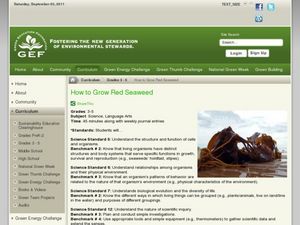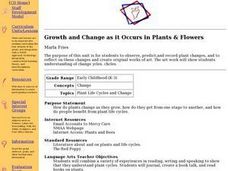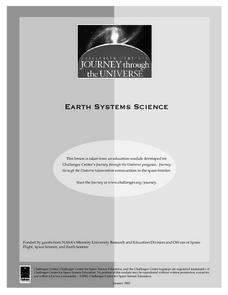Curated OER
Alive or Not
In this organism worksheet, students review the characteristics that determine if something is alive or not. This worksheet has 5 fill in the blank and 7 matching questions.
Curated OER
Culturing Plants from Embryonic Plant Tissue
Student groups use lima beans to represent dicots and corn to represent monocots, soak the seeds, and separate the embryos from the cotyledons. They then place the seeds in Petri dishes in agar and observe for at least one week recording...
K12 Reader
Chaparral Ecosystems
Explore the impact of wildfires with a reading passage about ecosystems. Pupils read the passage and respond to five questions related to the content of the text.
Curated OER
Johnny Appleseed
Young scholars engage in a study of apples using children's literature. They conduct research using a variety of resources. Student list facts about apples and compare them while answering some guided questions. They plant some apple...
Curated OER
Moldy Jell-O
Mini mycologists plan an experiment to determine what affects the growth of mold on gelatin. A list of available materials is provided, but the procedure needs to be designed by the lab group. A data table is also provided in which to...
Curated OER
Ready for Roots
Fourth graders sort seeds and predict what conditions are needed for them to germinate. They keep the seeds moist, observe and measure their growth and graph the results. As the seeds start to grow students compare and contrast the each...
Desert Discoveries
Creating a Garden Journal
Youngsters create science journals which are used to record observations from the school garden. The goal of this activity is to help kids tune into nature by making daily observations on the growth of the plants, and also to take note...
Curated OER
How To Grow Red Seaweed
Students explore ocean biology by participating in a plant growing activity. In this seaweed lesson, students identify the importance and uses of seaweed in the ocean and examine different seaweed samples. Students utilize an aquarium,...
Curated OER
Growth and Change as it Occurs in Plants and Flowers
Students work together to observe plants and flowers through their life cycle. In groups, they make predictions and record changes in a journal. Using this information, they create their own original artwork and discuss the plants life...
Curated OER
Seed To Plant
Students are introduced to alternative methods of growing techniques: specifically, hydroponics. They, in groups, "adopt" a seed. They take care of their seed and make observations as it begins to germinate.
Curated OER
Seeds and Similarities
Students use the scientific inquiry method to identify the changes in a plant's life cycle. In groups, they plant different types of plants and use a chart to compare and contrast their growth rates. They share their conclusions with...
Curated OER
Growing Pains
Young scholars compare common food items with the parts of a plant. They grow their own plants to assess the difficulties in assisting a plant's growth and reproduction.
Curated OER
What Plants Need in Order to Survive and Grow: Soil
Students conduct an experiment to evaluate whether plants need soil to survive and grow. They plant two seeds, one with soil and one without, make predictions, and record and analyze the seed germination results on a worksheet.
Curated OER
Where Do Plants Get Their Food?
Young scholars think about the historical development of the scientific method. They design an experiment that replicates van Helmont's, using only specified materials. Pupils then improved upon van Helmont's procedure and also...
Curated OER
Seed Dispersal
Students determine seed dispersal methods. In this life science lesson, students make predictions about how seeds might move, then look at seeds under micrographs or microscopes to analyze the seed coat and how this helps dispersal. ...
Curated OER
Seed Sorting
Students examine and sort seeds. In this life science lesson plan, students make general observations of a tub of seeds, then develop sorting criteria for sorting the deeds. Lesson includes extension activities.
Curated OER
Plate Tectonics: Movin' and Shakin'
Young scholars are introduced to the causes of plate movements and the hazards they present. They plot the location of 50 earthquakes and 50 volcanic eruptions on a map and explore the relationships between plate tectonics, earthquakes,...
Curated OER
Lesson 4, Spring Migration. Milkweed Monitoring
Students monitor the growth of milkweed plants. The observations are made to help make conclusions about growth and development.
Curated OER
Insect Biology and Ecology: A Primer
Students explore insects and closely related organisms. They examine the growth and development of a lady beetle. Students classify insects and organize them. They investigate pest management.
Curated OER
Plant Reproduction
Young scholars investigate seeds and plant life by creating a germination chamber. In this botany lesson, students investigate the relationship between flowers and the fruit they produce while examining the structure of the flower. ...
Curated OER
Low-country Rice Planting and Cooking
Eighth graders compare the use of rice in the 1700s to the modern use of rice. In this lesson examining the importance of rice in US history, 8th graders learn about the role of rice in the early 1700s and compare the use of rice in...
Curated OER
How Does a Green Plant Grow?
Students examine how a seed grows, and design an experiment to explore this concept. They make predictions, conduct the experiment, record the results, and interpret the results.
Curated OER
Making a Soil Separator
Students investigate botany by creating a soil separating device. In this plant life lesson plan, students identify the needs of plants and how important the right soil is in the growing process. Students define different soil types...
Curated OER
Carrot Heads Garden
Students create a carrot garden. In this gardening lesson, students discuss the conditions needed in order to grown plants while creating their own garden. They read the story The Carrot Seed by Ruth Krauss.

























